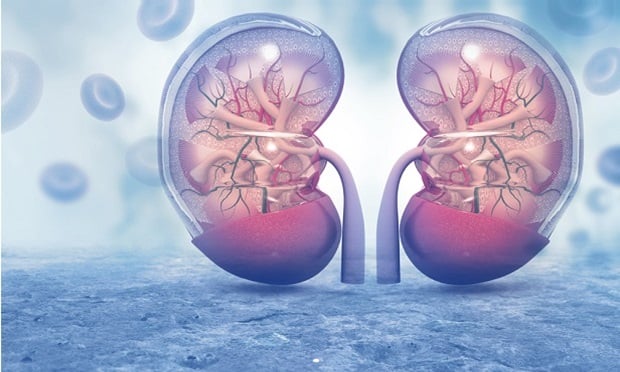 Elizabeth Holmes, founder of Theranos Inc., and husband Billy Evans exit federal court in San Jose, California, U.S., on Wednesday, Sept. 8, 2021. Holmes, 37, faces a dozen fraud and conspiracy counts that could send her to prison for as long as 20 years if shes convicted. (Photo: David Odisho/Bloomberg)
Elizabeth Holmes, founder of Theranos Inc., and husband Billy Evans exit federal court in San Jose, California, U.S., on Wednesday, Sept. 8, 2021. Holmes, 37, faces a dozen fraud and conspiracy counts that could send her to prison for as long as 20 years if shes convicted. (Photo: David Odisho/Bloomberg)
Prosecutors on Wednesday told jurors the story of Theranos founder Elizabeth Holmes is one of a billionaire "lying and cheating to get money" for her failing blood-testing company—a story that began in 2009, when the famed executive was "out of time and out of money."
During opening statements in Holmes' criminal wire fraud trial in San Jose, a U.S. Department of Justice attorney claimed that Holmes amassed "fortune, fame and adoration" as she misrepresented the accuracy and reliability of the company's blood-testing technology, its governmental contracts and endorsements from pharmaceutical companies.
Recommended For You
Assistant U.S. Attorney Robert Leach said Holmes was "haIled as the next Steve Jobs, whom she greatly admired" and "touted as one of the most powerful women in business. She had become, as she saw it, one of the most celebrated CEOs in Silicon Valley and the world."
Meanwhile, Holmes' counsel said she "did not go to work every day intending to lie, cheat and steal." Instead, Williams & Connolly's Lance Wade painted Holmes as a mission-driven "young CEO" whose company failed because she couldn't overcome business obstacles that she "naively underestimated" when starting the company as a 19-year-old Stanford dropout.
He also pointed out Holmes' partner, Billy, was sitting in the front row with their baby, whose August due date pushed back the trial.
Wade said the government was presenting events through "a dirty lens" that cast Holmes as a villain. He told the jury the defense would present more facts with a different lens, "A clean lens: the lens of everyday life of a company in Silicon Valley." He said running a Silicon Valley startup is a difficult job, and more businesses fail than succeed, but "failure is not the same thing as fraud."
"In the end, Theranos failed, and Ms. Holmes walked away with nothing," he said. "But failure is not a crime. Trying your hardest and coming up short is not a crime. And by the time this trial is over, you will see that the villain the government just presented is actually a living breathing human being who did her very best each and every day, and she is innocent."
The government alleged that Theranos was on the brink of financial collapse after contracts with pharmaceutical companies such as Pfizer dried up. "Some of you might have heard of Pfizer," Leach said. "We're all grateful to Pfizer for the ability to be here today." He said Pfizer told Theranos that it had no use for its technology, and never did business with the company again.
The government's first witness said Wednesday the company had trouble paying creditors. Danise Yam, Theranos' corporate controller and its top financial officer for about six years, said she had to "pick and choose" which bills to pay in early 2009, before Theranos raised $45 million in funding in 2010. Yam also said Theranos' outside auditor KPMG did not render an opinion on the company's financials between 2009 and 2015, even though small private companies typically audit financial statements once a year for "credibility."
Leach said Holmes and her ex-boyfriend—the company's president and chief operating officer Ramesh "Sunny" Balwani—tried to regain their financial footing by entering partnerships with Walgreens and Safeway based on "grandiose claims" that Theranos had "revolutionized blood testing with a miniature device that could test blood from a finger not a vein." But since the devices could not provide accurate and reliable results in real-time, according to Leach, Holmes and Balwani ordered subordinates to modify third-party devices that could run smaller blood sample sizes.
Wade said he would agree that there were "problems with Thernaos' clinical laboratory," but he said Balwani, who oversaw the lab, and lab managers, who are liable under federal law, were to blame for some tests not performing as well as others and a lack of adherence to company procedures.
Wade said jurors will hear Balwani was "hard charging" and expected long hours from himself and everyone, including Holmes. Wade said Balwani did not take well to those who disagreed with him, and that he had a temper, lashed out and did not always treat people kindly.
"There was a side of that relationship many people saw and may talk about during this case, but like with many personal relationships, there was another side to it that most people never saw. You'll have to wait for all the evidence and then decide how to weigh that relationship," he said.
Wade said he expects prosecutors to put 20 doctors or patients on the stand who will describe their experience with inaccurate Theranos test results. With the company generating about 8 million results, he said those 20 instances account for .00025% of the company's overall output.
"All labs have errors sometimes," he said, but Holmes still remains "steadfast in her belief in the technology."
Wade said the technology was "real" and "innovative," and the U.S. government issued a patent for work done at Theranos as recently as July. He said Theranos "spent millions on lawyers" to file its 176 patents.
To this day, Theranos' intellectual property is worth "hundreds of millions," he said, and may serve as the foundation for technical innovations in the lab testing industry.
© 2025 ALM Global, LLC, All Rights Reserved. Request academic re-use from www.copyright.com. All other uses, submit a request to [email protected]. For more information visit Asset & Logo Licensing.







